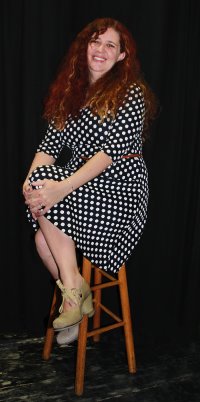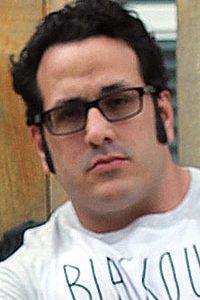Melissa Marr: Otherworldly
 Melissa Marr was born July 25, 1972 in rural Pennsylvania. She graduated high school in 1990 and put herself through college partly by working at biker bars. She earned a Master’s degree in Southern literature at NC State University, where she later taught English and Gender Studies.
Melissa Marr was born July 25, 1972 in rural Pennsylvania. She graduated high school in 1990 and put herself through college partly by working at biker bars. She earned a Master’s degree in Southern literature at NC State University, where she later taught English and Gender Studies.
She began publishing short fiction in 2005, and in 2007 published her debut novel, YA fantasy Wicked Lovely, which went on to become an international bestseller. The series continued with Ink Exchange (2008), Fragile Eternity (2009), Radiant Shadows (2010), and Darkest Mercy (2011). She also wrote the related Wicked Lovely: Desert Tales manga series in three volumes: Sanctuary (2009), Challenge (2010), and Resolve (2011). That was followed by YA fantasy Carnival of Secrets (2012, originally published as Carnival of Souls). She wrote middle-grade fantasy t
rilogy the Blackwell Pages with Kelley Armstrong (writing as M.A. Marr & K.L. Armstrong): Loki’s Wolves (2013), Odin’s Ravens (2014), and the forthcoming Thor’s Serpents. Her adult novels are dark Southern fantasy Graveminder (2011) and Old West-inspired portal fantasy The Arrivals (2013). Some of her short fiction was collected in Faery Tales and Nightmares (2011). Marr has co-edited anthologies, including Enthralled (2011) and Shards and Ashes (2013) with Kelley Armstrong, and Rags & Bones (2013) with Tim Pratt.
Her latest novel is a contemporary YA with paranormal elements, Made for You (2014). Upcoming titles include her first children’s picture book, Bunny Roo, I Love You, in April 2015 and YA fantasy Seven Black Diamonds in 2016.
Marr lives in Virginia with her husband and their three children.
Excerpts from the interview:
‘‘A lot of the best literature has fantasy aspects. This is something I argued as an academic. Speculative fiction is how we talk about things we aren’t ready to talk about in literal ways. Our literary ancestors did some amazing things by using speculative elements. That tradition, whether it’s folklore or literature, is what I want to be part of. Sometimes the most pressing issues are ones we can discuss best metaphorically, using otherworldly elements, be they magic or other types of beings. Look at Dracula and the fear of female independence. Look at Frankenstein and the fear of motherhood, and the fear of science. There’s so much richness there. That, to me, is what it’s all about. The best literature’s got SF and fantasy in it.
‘‘I grew up in a small, rural community where belief in the supernatural was fairly normal. I belonged to a community that was Irish Catholic, but with strong pagan overtones. I grew up surrounded by religious tradition, folklore, and storytelling. I was 12 when I decided I wanted to do three things with my life: I wanted to be a mommy, a teacher, and a writer. The hope was that being a teacher would enable me to afford to write someday. Then, as a teen, I had the misfortune of being raped, and was told I couldn’t have children as a result of the damage. So then the revised goal became teaching so I could afford to adopt. Jump forward a few years and I had an undergraduate and graduate degree in literature, and the only writing I was doing was academic, lecture notes and the essays. When I married a Marine who deployed, I went from working full-time to home-schooling my kids, teaching part-time, and not being able to sleep because my husband was being shot at – so I wrote my first book. It was horrible and has never been published and never will be. Immediately after that, I started writing what would become Wicked Lovely. Initially it was a short story, and in 2005 it became a novel which sold in a preempt within three days of submission. That was ten years ago last month. Then came other novels, so now I don’t teach. I write.”
…
 ‘‘My newest book, Made For You, is my first time stepping away from more strictly genre work to a book that is primarily contemporary. There is a supernatural element, because I can’t not have that. In part, it’s inspired by my own experience of having a stalker when I was in my twenties. This is one of the first times I’ve really put myself in the head of the antagonist in a novel, which is sort of what you do when you’re trying to understand why you’re being stalked. When my publisher invited me to write something more contemporary, it was clear this was the right book. I got to write from the perspective of a serial killer. I did research over the years, because I’m fascinated by crime, but some of that comes from having my own stalker. In fact, being stalked resulted in the first time I was quoted in a newspaper: ‘‘‘I got me a gun,’’ Melissa Marr, instructor, English, NC State University.’ (I have to believe my rural/Southern accent wasn’t quite that pronounced at the time.) Either way, though, I had a stalker, and the police recommended I have home protection, so I went out and bought a shotgun. I was curious then and now about what causes people to become stalkers. My stalker was a stranger – it wasn’t someone I had taught, or dated, or any of the things the police asked. The process of identifying the stalker was made even more complicated by the fact that I have trouble identifying faces. So for Made For You I used some of my own experiences for research in a way I’ve never before been able to do in a book.”
‘‘My newest book, Made For You, is my first time stepping away from more strictly genre work to a book that is primarily contemporary. There is a supernatural element, because I can’t not have that. In part, it’s inspired by my own experience of having a stalker when I was in my twenties. This is one of the first times I’ve really put myself in the head of the antagonist in a novel, which is sort of what you do when you’re trying to understand why you’re being stalked. When my publisher invited me to write something more contemporary, it was clear this was the right book. I got to write from the perspective of a serial killer. I did research over the years, because I’m fascinated by crime, but some of that comes from having my own stalker. In fact, being stalked resulted in the first time I was quoted in a newspaper: ‘‘‘I got me a gun,’’ Melissa Marr, instructor, English, NC State University.’ (I have to believe my rural/Southern accent wasn’t quite that pronounced at the time.) Either way, though, I had a stalker, and the police recommended I have home protection, so I went out and bought a shotgun. I was curious then and now about what causes people to become stalkers. My stalker was a stranger – it wasn’t someone I had taught, or dated, or any of the things the police asked. The process of identifying the stalker was made even more complicated by the fact that I have trouble identifying faces. So for Made For You I used some of my own experiences for research in a way I’ve never before been able to do in a book.”
…
‘‘One of the things I get out of short stories is the way I can play with different voices and styles that I don’t have to sustain for 80,000 words. My readers are more forgiving of me going in totally new directions in a short story, so it lets me experiment. With short stories there is also something palate-cleansing about it. Every year I have one or two stories that I write in between books or in my off time, or if I’m stuck on a book, I have this little gem that’s just mine. Some of them I sell, and some of them I don’t. Some I don’t share with anyone. The short story is my private space where I can be the kind of writer I would love to have the leisure to be. People talk about how they want to retire and write a novel. I want to retire and write short stories! That and poetry. That’s my retirement fantasy. I write poetry now, but I don’t share it with anyone. Oh, and I’d also like to do the sort of literary things that I once taught! But those aren’t going to pay the bills for my children’s passions. I’ve got a teenager working on his private pilot’s license, and a daughter finishing a university degree in archaeology and anthropology, and in her free time going off to live in the jungle and work on Mayan ruins. Adopting a baby with my youngest’s health issues cost more than some of my book deals. Children are expensive. The kind of literary novels I fantasize I will someday be able to write aren’t going to allow me to be the sort of mom I want to be for them.”
…
‘‘My drive is definitely characters. If I don’t have a character, I don’t know what the plot’s going to be, because I believe plot is a result of characters and their individual motivations being in conflict. Everything I write has multiple points of view. I think that’s life. Understanding who we are and where we’re going is often done in the context of those around us. Sometimes things that seem reprehensible make sense if you get into the other person’s shoes. I think when I figured that out… well, as my first editor was fond of putting in my biography, I ran a biker bar in North Carolina. That was how I paid the bills. Those people were a gift to know. One of the things that became very clear to me is that, when you work in a place with a different set of social rules, your sense of what is ‘right’ will shift. Working there made me realize how much the objective idea of right and wrong is not possible. Things that were right in most circumstances would not have been right in that bar, and things that were right in that bar would not have been right in the university where I was teaching. That experience had a big impact on how I see the world and how I write, because I know that people others might see as villainous don’t think of themselves in that way. If we boil down their motivations, we can see where they’re coming from. It doesn’t necessarily make a lot of acts that are reprehensible okay, but it does make them comprehensible.”
…
‘‘My next YA, Seven Black Diamonds, which I just finished revising, comes out January 2016 with HarperCollins. It’s the first in a duology, faery series. Now that I have a few books between the first faery series and now, I felt comfortable going back and writing another faery book. ‘Faery sleeper cells’ is the premise. With my environmental concerns, it seemed like faery terrorists would be fun to explore. Look at the way humanity is destroying the earth. What happens if you have supernatural beings who require healthy nature to thrive? Basically, I took the concept of guerilla warfare and applied it to angry faeries in a near-future setting.”







